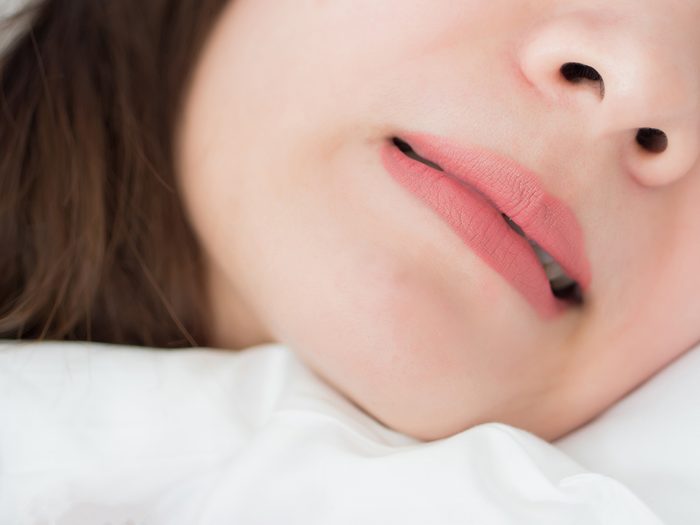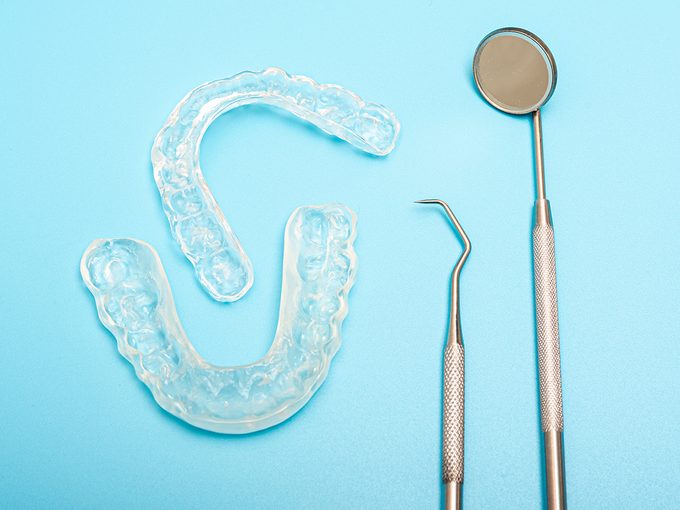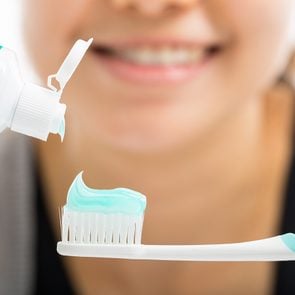Teeth Grinding is On the Rise—Here’s What You Can Do About It

Experts say stress may be behind an uptick in teeth grinding, a behaviour known as bruxism. Find out the best ways to minimize damage to your pearly whites—and beat bruxism for good.
Over the last two-and-a-half years, Canadian dentists have reported an increase in tooth fractures, damaged fillings and jaw soreness among their patients. While it’s too early to say for sure, some experts surmise that the stress of the pandemic has caused an uptick in the number of people who grind their teeth and clench their jaw—behaviours known as bruxism.
Bruxism is involuntary, can happen while a person is awake or asleep and can lead to pain and tightness in the jaw, neck or face, as well as tooth sensitivity. Because of this, bruxers are three times more likely than non-bruxers to experience headaches.
What causes teeth grinding?
There’s a strong link between high levels of stress or anxiety and bruxism—particularly when it comes to daytime clenching. While more research needs to be done to pinpoint the correlation, some studies suggest that tooth clenching while awake may be a coping mechanism, much like how some people bite their nails or find themselves tapping their feet.
Stress isn’t the only cause. If you drink an excessive amount of caffeine (more than six cups a day) or alcohol—both of which trigger jaw muscles to hyperactivate—you’re also more prone to bruxism. In fact, it’s been found that heavy alcohol consumption (three or more drinks a day) doubles a patient’s chance of grinding their teeth and clenching their jaw while sleeping.
One theory about bruxism is that humans first began to grind their teeth at night as part of our ancient fight-or-flight response, triggered by our sympathetic nervous system.
Gilles Lavigne, a professor in the faculty of dentistry at the University of Montreal, compares this system, which operates without our conscious awareness, to an internal cuckoo clock: every 20 to 40 seconds, the cuckoo pops out of the clock face (in this case, deep sleep) and scans the surroundings for signs of danger. If there are none, it goes back inside, and we continue to sleep. But if it senses a new smell or sound, for example, the cuckoo starts to chime, and our muscles, including those in our jaw, tense in preparation to face the threat or run.

How to stop grinding your teeth at night
To prevent tooth damage from nighttime bruxing, a dentist can prescribe a personalized mouthguard that protects against wear and tear. However, that doesn’t address the root of the problem—whether it’s stress or over-caffeinating—and it’s possible for bruxing to lead to chronic pain or even cause the jaw to freeze into place, a condition known as lockjaw. (Here are 13 signs you need to see a dentist right away.)
For this reason, if your bruxing becomes more frequent or painful, you should consider taking a holistic approach to treating it. A psychological counsellor can help you determine the source of your stress or anxiety, as well as assist with cutting down on caffeine and alcohol. Meanwhile, a physiotherapist can alleviate pain by massaging the muscles of the head and face and by using a technique called dry needling, where needles are inserted into muscles in the jaw to release tension.
The connection between screen-time and bruxism
Karim Meghji, a physiotherapist in Calgary, adds that he’ll also help people with their overall body posture, since leaning into a computer or spending a lot of time on the couch can lead to more bruxing. “When people’s heads are sitting forward, their necks are getting stressed and they’re basically sitting in a compressed posture,” he says, explaining that this puts pressure on the neck and jaw muscles, causing them to stay activated—and clenched—when they should instead be relaxed.
While the pandemic has certainly increased bad posture behaviours, Meghji says there’s been a silver lining: patients, with more time on their hands, have relied less on quick-fix treatments like mouthguards and are more open to the idea of investing in long-term changes to their lifestyles and mental health.
Now that you know how to stop grinding your teeth at night, find out the signs of disease your teeth can reveal.






